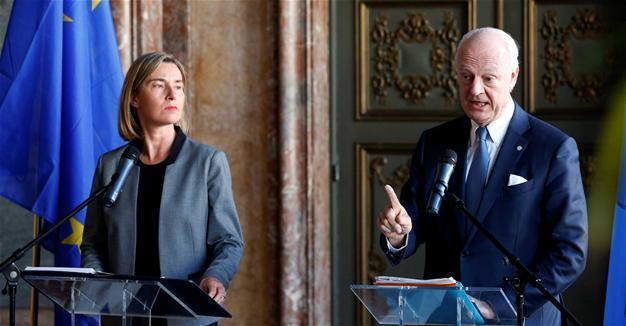Turkey-EU suspend political talks until June
Sevil Erkuş - ANKARA

Turkey and the European Union are not planning to hold any meetings at a political level until the start of summer, diplomatic sources have told the Hürriyet Daily News.
Turkey and the EU had been expected to hold a leader’s summit, along with political, economy and energy dialogue meetings, all on the ministerial level.
The gatherings were postponed until the April 16 referendum in Turkey and then until June, well after the French elections upon the demand of the EU, according to sources.
In February, Ankara and Brussels discussed holding a Turkey-EU summit at the leaders’ level in either late May or early June with a positive agenda. Along with political talks with Turkish President Recep Tayyip Erdoğan, EU leaders also expected to authorize the commission to start customs union talks with Ankara by July 1. However, Germany made clear to its EU partners that “there will be no such summit until German elections in September and that no action will be taken on visa liberalization for Turkish nationals.”
Turkey won’t attend EU’s Syria meeting at political levelAnkara will also not participate politically in a meeting on Syria in Brussels organized by the EU on April 4-5 amid simmering tension with the bloc.
Turkey is not attending the “Support of Syria and the Future of the Region” meeting, which is being organized under the auspices of the EU, Germany, Kuwait, Norway, Qatar, the United Kingdom and the United Nations, on a political level because it is not satisfied with an EU response over the format of the meeting and its own title, sources said.
“Turkey, which pioneered the establishment of a cease-fire in Syria and the revitalization of the political process, did not receive a satisfactory answer to the expectation of participation in a format and capacity that could provide the maximum contribution to the conference, which is the continuation of the 2016 London Contracting Conference and will also focus on the political dimension of the conflict,” another Turkish diplomatic source said, elaborating on the reasons for the rejection.
Conference participants will “also consider the prospects for post-agreement assistance once a genuinely inclusive political transition is firmly under way,” the European Council of member countries said on its website.
Sources said the situation was an effective reason for Ankara’s decision to not attend the conference, adding that Turkey, as the country which hosts the largest number of Syrian refugees, will attend the technical sections of the conference in order to contribute to the activities of the welfare of Syrian refugees.
Turkey’s attendance at the conference was greatly anticipated since it is home to the largest number of Syrian refugees, around 3 million.
But the EU’s foreign policy chief, Federica Mogherini, said April 3 that Turkish Prime Minister Binali Yıldırım had not replied to the invitation, even though his counterparts in Jordan and Lebanon were set to attend.
The EU expects U.N. Secretary-General Antonio Guterres to attend along with Staffan de Mistura, his special envoy who is mediating the Syria peace talks.
De Mistura reported “incremental progress” at the latest talks on March 31 in Geneva and said he expected to announce a date for the next round this week.
The United States and Russia, meanwhile, are expected to be represented by junior officials or diplomats, not ministers, Agence France-Presse reported.
Mogherini has billed the gathering in Brussels as a follow-up to a donors’ conference last year in London, which raised about $11 billion (10 billion euros) for humanitarian aid programs in the devastated country.
The conference is set to begin on April 4 with a series of workshops, followed by a formal session on April 5 to review progress on the London pledges and see what additional measures might be taken.
The U.N. Food and Agriculture Organization said April 3 that Syria would need an initial $10.7 billion to $17.1 billion to revive agricultural production, depending on how the conflict plays out. It estimated that the war has caused more than $16 billion in lost crop and livestock production and farming assets.
Since 2011 the FAO has been providing assistance for around 2.4 million Syrians in rural areas and on the outskirts of cities including Aleppo, Homs and Damascus.
 Turkey and the European Union are not planning to hold any meetings at a political level until the start of summer, diplomatic sources have told the Hürriyet Daily News.
Turkey and the European Union are not planning to hold any meetings at a political level until the start of summer, diplomatic sources have told the Hürriyet Daily News.